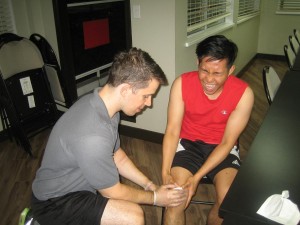Degenerative arthritis of the knee is characterized by the gradual deterioration of the cartilage along with the supportive structures of the joints, resulting to disfigurement and mobility loss. Various types of degenerative arthritis can affect just one or both joints with its distinct characteristics. The management for degenerative forms of arthritis of the knee is based on the severity of the condition, underlying mechanism of joint damage and level of disability.
Osteoarthritis
The thigh and shin bones meet at the knee joint and separated by the firm cartilage discs. Always bear in mind that the knee cartilage provides a durable, smooth surface that allows smooth joint movement. If an individual has osteoarthritis, the cartilage progressively wears out. Over time, inflammation sets in the knee joint as the bones and other supporting structures rub against one another. Long-lasting inflammation quickens the deterioration process, leading to increasing swelling, stiffness, pain and joint deformity.

Some adults are likely to end up with characteristic knee osteoarthritis. This condition is known to cause disability, thus requiring knee replacement among those with severe cases. A knee replacement surgery is indicated for most individuals who have osteoarthritis.
Total knee replacement is considered as the last resort for individuals with severe osteoarthritis. During the procedure, the surgeon takes away the damaged joint and replaces it with a metal or plastic device. The potential effects of surgery include incision site infections and blood clots. The recovery from this procedure usually takes up to several weeks and requires extensive physical therapy. Some individuals might require additional surgeries and even another replacement during his/her lifetime.
Psoriatic arthritis
Psoriatic arthritis is described as a degenerative joint condition that affects individuals who have psoriasis. The condition typically affects the joints of the hands but can also affect one or both knees. The process of joint destruction with psoriatic arthritis is quite similar to rheumatoid arthritis. Take note that it affects both men and women and can occur from childhood through adulthood.
There is no cure for psoriatic arthritis, thus the treatment is focused on managing the inflammation in the affected joints to prevent disability and joint pain. The commonly used medications for this form of arthritis include non-steroidal anti-inflammatory drugs (NSAIDs), disease-modifying anti-rheumatic drugs (DMARDs), immunosuppressants and TNF-alpha inhibitors. Even steroid injections directly into the affected joint can be given to minimize the inflammation. Lastly, joint replacement surgery is the preferred option for joints that are severely damaged by psoriatic arthritis. This involves the use of artificial prostheses made out of plastic or metal.
Rheumatoid arthritis
Rheumatoid arthritis is a condition in which the immune system wrongly attacks the joint lining tissue. The continuing inflammation linked with the autoimmune attack steadily destroys the affected joints. Rheumatoid arthritis tends to affect more women. The condition might be present at any age but usually diagnosed among individuals 35-50 years old.
With this form of arthritis, it frequently involves the joints in the hands but can also affect other body sites including the knees. The disease can affect both knees simultaneously.
